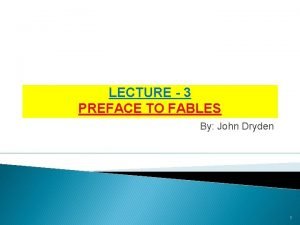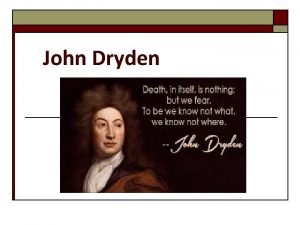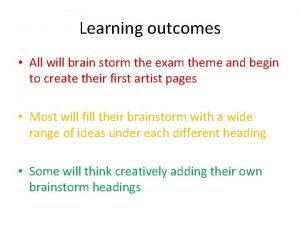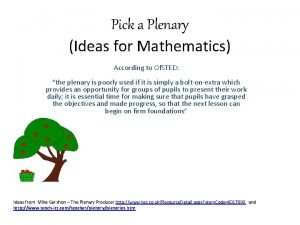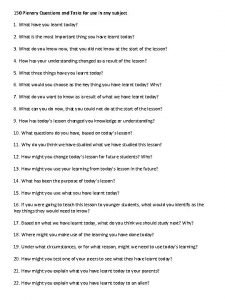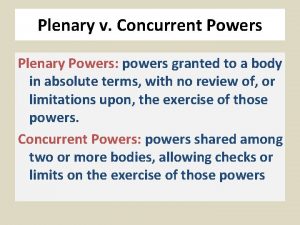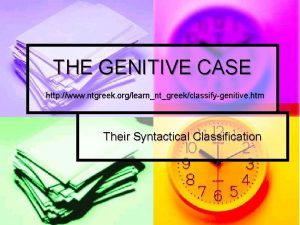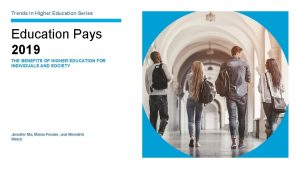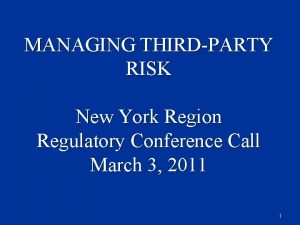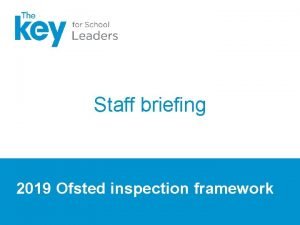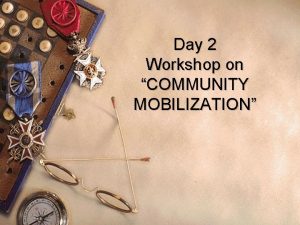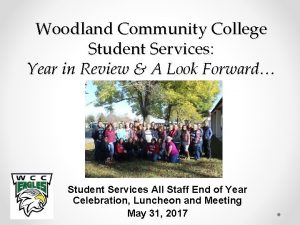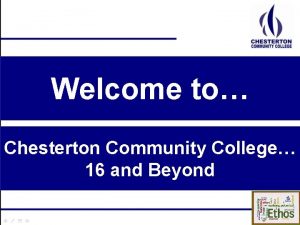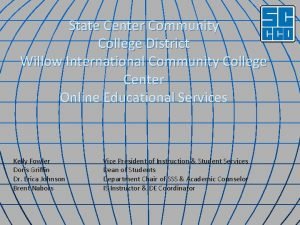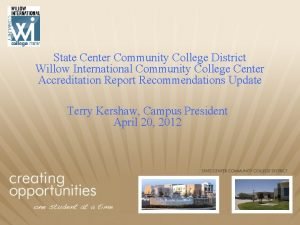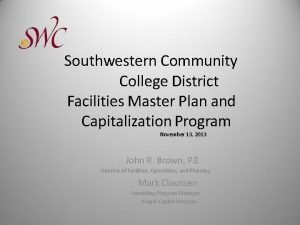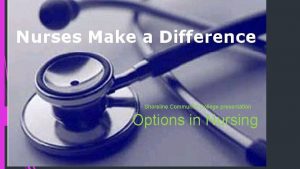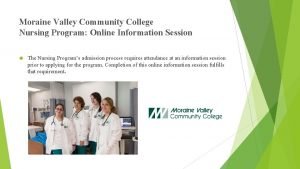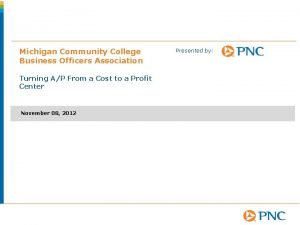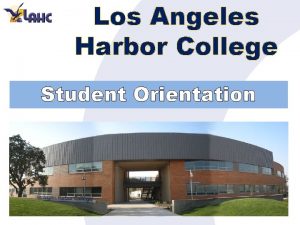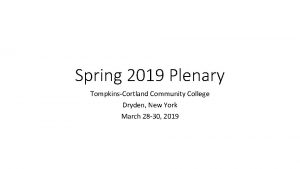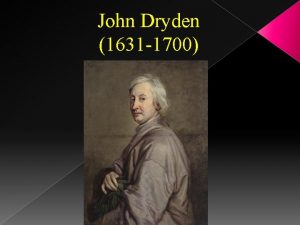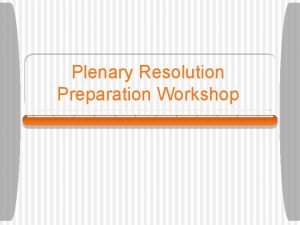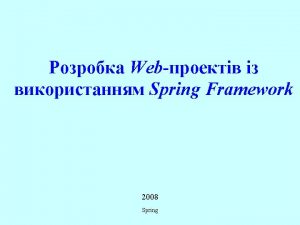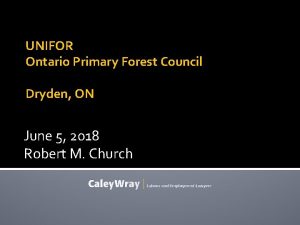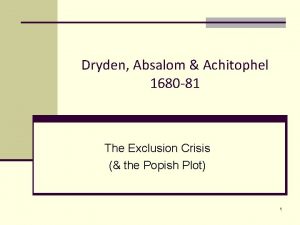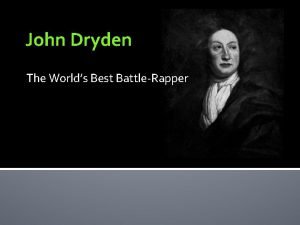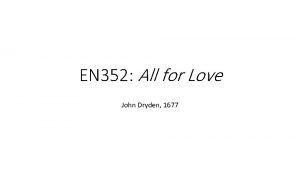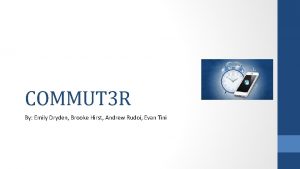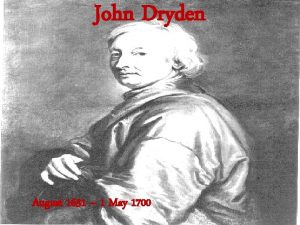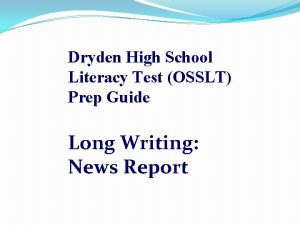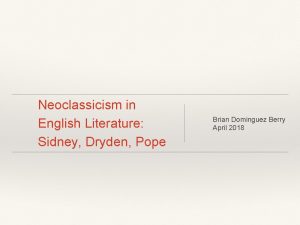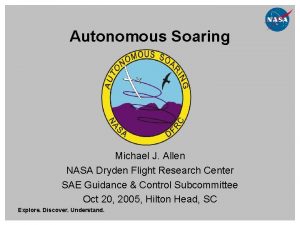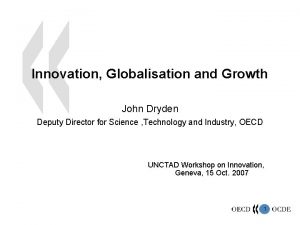Spring 2019 Plenary TompkinsCortland Community College Dryden New




























- Slides: 28

Spring 2019 Plenary Tompkins-Cortland Community College Dryden, New York March 28 -30, 2019

Presenters • • • SUNY Chancellor Kristina Johnson SUNY Provost Tod Laursen Orinthia Montague, President, Tompkins Cortland Community College William Reuter, President, Community College Business Officers’ Association Karen Ryan, Executive Director, New York Community College Trustees Mike Braun, President, SUNY Student Assembly Keith Landa, Vice President, SUNY University Faculty Senate Martin Burke and Matthew Cotter, President and Executive Director, CUNY University Faculty Senate Ronald Sarner, Professor, SUNY Polytechnic Institute Mark Garrison, Professor, D’Youville College, Keynote Speaker

Important Issues Discussed • SUNY General Education review process – campus responses to the working group’s “Green Paper” • SUNY Online Initiative White Paper and webinars – concerns about fast timetable, lack of governance process, program selection process, faculty involvement, mechanics, income sharing, shifting of current students from CCs to SUNY Online, etc. • PRODi. G: SUNY’s initiative to support diverse faculty hiring • Guided Pathways • Predictive analytics • Community College funding formula and enrollment Resolutions passed: General Education Review, SUNY Online White Paper, and Inclusion of Shared Governance in Guided Pathways

Discussion of Gen. Ed Green Paper • Working group on General Education Green Paper: Recommendations to Provost who will create a Task Force. See also FCCC Resolution. • Areas of Agreement • Learning outcomes should enable but not compel competency based learning outcomes • Policy should align with Middle States but preserve campus governance based innovation of Gen. Ed • Update the language of Gen. Ed for “ 21 st Century Global Citizen. ” • Spread Gen. Ed over 4 years • Continued effort for seamless transfer • Areas of Concern • Majority support (but not unanimous) for reduction to 21 credits for AA/AS (leaving 30 for BA/BS) • Should we require Natural Science category (like for Math), or infuse/add Scientific Reasoning across courses? • How do we define “ 21 st Century Global Citizen”? – does this mean we should require all 10/10 categories over 4 yrs? • How do we make sure skills learned in the 1 st yr are reinforced in 2 nd yr?

SUNY Chancellor, Dr. Kristina Johnson • PRODi. G: Promoting Recruitment Opportunity Diversity Inclusion and Growth – 10 year process Ø Evidence based faculty diversity initiative: Incentivize and enable the hiring of 1000 new full-time faculty members from underrepresented groups. Ø Leverage SUNYs internal pipelines and pathways from grad schools to academic careers, build opportunities for current underrepresented students to fill future positions in academia. Ø Impediments to faculty diversity have been identified by researchers. Plan to systematically address multiple issues. Ø Campuses will be encouraged (not required) to submit a Campus Diversity Hiring Plan to be considered for PRODIG funding in fall 2019.

Chancellor Johnson: PRODi. G Timeline • July 19 – Campus diversity hiring plans due (FCCC asked them to consider how governance is involved in drafting the plan as well as shared governance sign-off) • Aug 19 – SUNY feedback to campuses • Sept 19 - Funding announcement, implementation of campus plans, begin rolling deadlines with new searches/hires • May 20 - Annual report due

Chancellor Johnson: Other SUNY Initiatives • SUNY Achieve includes: • • Math Pathways 3. 3 M Developmental English Learning Communities 1. 2 M Guided Pathways Strong Start to Finish • Sustainability and Green Energy Plan • Saved $200 M year on electricity alone • NY Higher Ed Large scale renewable energy project • Green revolving loan – State interest rate plus. 5% (about 2%) to get a loan for projects that save energy. Will take proposals for up to 1 million • Retrofit NY • Electric Vehicle Guidance • Energy Performance Contracting Guidance

Dr. Orinthia Montague, President, Tompkins-Cortland Community College • Welcome to our campus • Grand opening of Recovery center – 1 st at SUNY • Campus prodigy model whereby TC 3 identifies and supports local URM students through graduate school for future hire on campus • Gave NYCCAP report – mostly focused on NYS budget (not passed as of the report)

Provost Tod Laursen • Update on SUNY Online Initiative – fully online degree programs - Pilot phase of 5 – 10 registered programs slated to begin Fall 2019 § pilot phase will allow for system development, integration, and testing § identification of academic and admin support needed § identify new programs from roll-out in future semesters § pilot programs will be announced April 17 - Still reviewing comments of the white paper - Thematic webinars have occurred - Several cluster areas of exploration listed - Revenue sharing arrangements have not been ironed out yet

Provost Laursen, cont. • Faculty Council SUNY Online concerns during the Q & A § Roll-out being conducted too hurriedly and many issues of great concern to the community college sector have not been adequately considered § Webinars were inadequately advertised and communicated— many delegates heard only from FCCC and not from CAO’s § Transcripts of webinars posted to Workplace group, but many campuses cannot use their credentials to access Workplace and others have not been made aware of Workplace § What institution will issue the degree if students take courses at multiple institutions?

Provost Laursen, cont. • Faculty Council SUNY Online concerns, cont. § Competing within the system—what will prevent state ops. from cannibalizing from the community college sector? § Cross-staffing and use of TA’s to cover/teach classes—community colleges don’t have TA’s § Faculty purview over curriculum § Adjuncts (non-contractual) being brought in to teach pre-canned courses

Provost Laursen, cont. General Education Review -Phase 1 – a white paper (Fall ‘ 18) followed by green paper (available now for comments until May 1) - Phase 2 – formation of Advisory Committee, May 2019 - Provost will charge task force with green paper review and adoption of recommendations - Members will include FCCC, UFS faculty designees, CAOs, registrars, students, SUNY staff - Policy will be drafted and shared with campuses for feedback - Phase 3 – Implementation

Dr. Ronald Sarner, SUNY Polytechnic –Utica Predictive Analytics for Student Advisement • Like Guided Pathways without Guided Pathways • Placement exams in Math/Writing did not predict well for computer science courses since they didn’t test for the math needed in that discipline • What worked better was looking at a combination of high school average (GPA) and the SAT/ACT scores, which predicted success more accurately in ENG 101 but also finite math • Identified “high-risk” courses in which student success or failure was predictive of overall success or failure

Ron Sarner, cont. • Students should be advised not to take multiple “high-risk” courses per semester, especially during first semester – “We create drop-outs!” • The four big predictors: high school average (GPA), whether the student is/is not a transfer student, whether or not the student is on financial aid, SAT/ACT scores • Ron will gladly travel to your campus to show you how to do this…keep the honorarium and just pay for his travel/lodging/meals!

Bill Reuter – CCBOA • The enrollment picture state-wide has not improved—all 30 community colleges are projecting a decline in enrollment (average of 5%)—we are still experiencing the paradox of strong economy/less traditional age students— 8. 25% enrollment drop over the last 2 years for a total of 13, 000 FTE’s • 80% (state average) of funding is enrollment driven (tuition, fees, and State FTE support) • From 2016 -2017 to 2025 -2026 a drop-off rate in enrollment of around 11% is expected based on current public school numbers • On the plus side, the State budget looks positive for us

Karen Ryan – NYCCT • “We are like balloons floating on the wind, until the State budget drops!” • Good things to consider include the fact that of the 96, 000 degrees granted SUNY-wide in 2018, fully 54% were from the community college sector • Stressed local partnerships with businesses including the need to restructure degree programs to match local business needs • Her organization is seeking to create a unified front with the presidents for advocacy

Mike Braun – SA President • Brought six of his fellow SA officers and representatives • Reported that 80% of SUNY campuses were represented at the SA assembly • Held their first ever local advocacy week during which they pressed for the community college floor funding formula • They have focused on leadership development, have attended 50 education conferences, recruited 80 students from 48 campuses into leadership roles • Partnership expansion: working with student governance from fifteen states (representing seven million students), and bolstered relationships with UUP, NYSUT, NYPERG, CUNY, etc.

Mike Braun, cont. • Have increased their presence in social media, including Facebook, Instagram, and Twitter • Have continued to lobby for more funding for student mental health concerns • Have linked to a grassroots advocacy phone app called Phone 2 Action • Spring Conference enjoyed the highest ever attendance and most campuses represented

Keynote Address: Dr. Mark Garrison (Professor of Education Policy and Research, D’Youville College, Buffalo NY. ): “Data-driven Decision Making in the Era of Artificial Intelligence: Algorithmic Education and the Future of Shared Governance” Dr. Garrison spoke about the relationships among the following phenomena: • The “skillsification” of education – the idea that all learning can be broken down into discreet transferable skills independent of context, culture, or discipline (such as “critical thinking”) - the basis for micro-credentials, badging, and competency based education • Behaviorist psychology (human beings are machines, consciousness and free choice do not exist, anti-democratic) – absent from academic psychology but still dominant in corporate and especially tech culture, built into social media and much of electronic technology – cybernetic theory has a similar philosophical basis • Shared governance as a meta-theory about decision-making - increasingly faculty are marginalized, but so are administrators – decisions about teaching and learning are made outside the institution and are embedded in the technology

Dr. Garrison, cont. • Algorithmic education removes educational decisions from the educator • “Datafication” – “If it’s not in a database, it doesn’t exist” – “Everything will be programmable” • The view of science and measurement as means of governing, controlling behavior – not of understanding – the aim is to manipulate and monetize – consciousness is absent from the model – “understanding” is real but not measurable • Shared governance must talk about these cultural changes critically - we need to develop humanistic alternatives to these narratives • Humans have enormous power but haven’t learned how to control it – the most important power we have is the power to decide - education is supposed to be a source of hope for people – hope that problems can be solved.

Liaison Report: Martin Burke, Pres. CUNY UFS • CUNY currently coping with upheavals in leadership • Currently - Interim Chancellor, Interim General Counselor and Sr. Vice Chancellor, New Provost, two Interim Vice Chancellors, two Interim Community College Presidents • Have spent much of the year revising the UFS Charter • Offered words of advice about SUNY Online based on experience with unsuccessful CUNY Online (mostly due to legal and campus governance issues) • Intellectual property rights, outside vendor rights, intra-university competition • Dr. Mathew Carter, Exec Dir. CUNY UFS – invites SUNY CC members to read the CUNY UFS blog for several issues that overlap with FCCC • http: //www 1. cuny. edu/sites/cunyufs/ • Ex. , Dev. Ed dissolved at CUNY by Spring 2020 – questions arise about campus governance process involved

Liaison Report: Keith Landa, VP SUNY UFS • Recent UFS Plenary themes focused on Culture (seamless transfer, Pres. on-boarding, child-care, student services, cultural appreciation & appropriation) • Recent work in Collaboration with FCCC • General Education Review • Student Mobility: Survey regarding upcoming reviews of Transfer Pathways • SUNY Council on Assessment (SCo. A) • Mentoring program, SUNY Assessment Scholars, Shared Resources • SUNY Online • Upcoming • CGL Training at SUNY Voices

President’s Report: Nina Tamrowski • Federal Government Politics • There is a push for the Higher Education Act reauthorization to pass. • Addressing college debt: simplifying FAFSA, collecting data, tracking loan repayment, expansion of Pell grants to Dreamers and the incarcerated & increasing the maximum award • Businesses are lobbying hard for Pell to be extended to non-credit workforce development programs & off-campus workforce assignments. Concern about reducing the amount of Pell available for academics • Consideration for credit hour re-definition – one hour per week in-class, 2 hour out of class work. Remove the out-of-class language – more room for innovation. There is a lot of opposition in Congress. Testimony is coming in from everyone but academics. • We think the motivation is to allow accelerated courses – direct assessment courses such as SNHU, Phoenix. Flexibility and innovation with online education. Accrediting agencies could create the standards, or rules may be made by Dept. of Education. SUNY is working on a position. • Should examine position statements from AAUP, ACE

Committee Reports: Academic & Student Affairs Committee • Putting template together for services to vulnerable students. Will work with CGLs to see how to make this effective. • Of the program proposals that come into SUNY only 1 -3% get approved without being sent back for additions/changes. Committee will create a FAQ of tips. • Policy making that happens in residence halls is not being communicated to the academic side – a survey will go out to campuses. • GEN ED RESOLUTION in RESPONSE to GREEN PAPER RECOMMENDATIONS: Voted – passed, no campus endorsement needed

Committee Reports: • Awards: • Changes recommended for the distinguished faculty award. Change to having one award with three subcategories of Faculty Service and Teaching. This year there were 18 nominations for distinguished rank and none from the Community Colleges. • Communications & Professional Development: • Met with SUNY CPD – discussed trainings and courses offered. Mental health and opioid use were top of the interest for people. Exploring the development of opportunities in these areas. • Briefing Book updates deadline for next iteration May 31 • Working on “Welcome Package” for new presidents, provosts, and SUNY personnel • Issues with Survey Monkey, so need to find a different online survey platform. Continuing research will bring a fuller recommendation.

Committee Reports: • Educational Initiatives: • Drafted a report based on impact of the Excelsior Scholarship – most significant finding (thus far) is students’ ability to maintain eligibility • A few questions were revised and sent out to non-respondents (15) • Developing a Guided Pathways survey of campuses in the first cohort to guide and inform those who are in the second cohort. • Governance • Looking at the online initiative from a student perspective • RESOLUTION on RESPONSE to SUNY ONLINE DRAFT WHITE PAPER and RESOLUTION in APPRECIATION for USE of SHARED GOVERNANCE in GUIDED PATHWAYS INITIATIVE • No campus endorsement needed

Elections of New Officers President – Christy Fogal, Monroe Community College Vice-President – Bruce Rowe, North Country Community College Treasurer – Michael Delaney, SUNY Erie Community College Secretary – Danna Prather-Davis, Suffolk County Community College

Upcoming Dates • CGL Leadership Institute, June 4 -5, Albany • Executive Committee Retreat, June 13 -15, Rochester • FCCC Summer committee meetings, Friday 8/16, Albany • Fall Plenary, October 3 -5 – SUNY GENESEE Community College
 Translate
Translate Preface to fables analysis
Preface to fables analysis Dryden metaphrase, paraphrase imitation
Dryden metaphrase, paraphrase imitation A song for st cecilia's day by john dryden
A song for st cecilia's day by john dryden Hidden flame by john dryden
Hidden flame by john dryden Dryden mac flecknoe
Dryden mac flecknoe Paul catherall facts
Paul catherall facts Spring, summer, fall, winter... and spring (2003)
Spring, summer, fall, winter... and spring (2003) Fall winter spring summer
Fall winter spring summer Plenary inspiration
Plenary inspiration Quick plenary ideas
Quick plenary ideas Plenary questions
Plenary questions Plenary power
Plenary power Pyramid plenary
Pyramid plenary Genitive case meaning
Genitive case meaning Education pays college board
Education pays college board Third party risk management conference 2019 new york
Third party risk management conference 2019 new york Bucks new university ranking
Bucks new university ranking Ofsted new framework 2019 slides
Ofsted new framework 2019 slides Plan together in community mobilization
Plan together in community mobilization Woodland community college counseling
Woodland community college counseling Chesterton community college open evening
Chesterton community college open evening Willow international center
Willow international center Willow international college
Willow international college Southwestern community college
Southwestern community college Shoreline community college nursing
Shoreline community college nursing Moraine valley nursing program requirements
Moraine valley nursing program requirements Community college business officers
Community college business officers Los angeles harbor city college
Los angeles harbor city college

